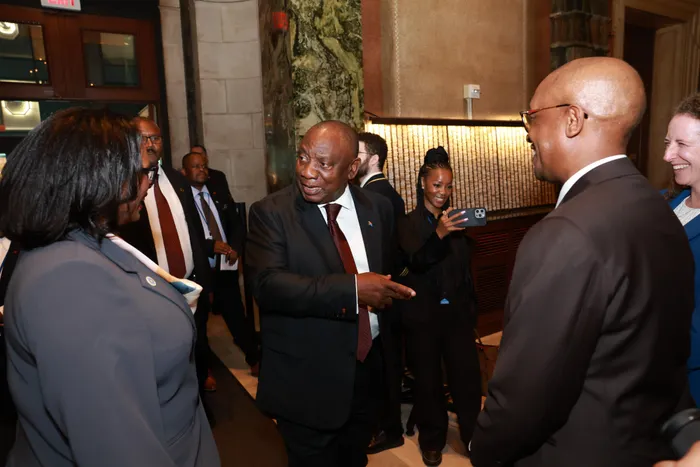SA, US move closer to reciprocal trade agreement amid tariff tensions
US TARIFFS

President Cyril Ramaphosa and Minister of Trade, Industry and Competition, Parks Tau, addressed the South Africa-US Trade and Investment Executive Dialogue in Washington on Wednesday night.
Image: Supplied/GCIS
South Africa and the United States are edging closer to formal negotiations on a reciprocal trade agreement, following weeks of intensive engagements aimed at resolving long-standing tariff disputes and strengthening bilateral economic ties.
Speaking at the South Africa-US Trade and Investment Executive Dialogue in Washington on Wednesday night, Minister of Trade, Industry and Competition Parks Tau underscored the importance of the US as the country’s second-largest global trading partner, while South Africa remains the second-largest African destination for US exports.
“This underscores the critical importance of our bilateral relationship, both as a platform for two-way trade and as a gateway into the broader African market,” Tau said.
However, he cautioned that challenges persist, particularly the proposed 30% tariff on selected South African exports, along with existing Section 232 tariffs on steel and aluminum, which risk undermining key sectors and eroding the benefits of the African Growth and Opportunity Act (Agoa).
Tau confirmed that South Africa and the US have been working on a draft text for a reciprocal trade agreement. Following initial exchanges, the US has provided a revised draft which Pretoria is now considering with relevant departments and stakeholders.
"We have spent the past few weeks in intensive engagement with the US government to seek resolution to matters related to reciprocal trade between our respective countries. We had the opportunity to meet with the United States Trade Representative last week at the back of the engagements between our respective teams to intensely look at a draft text on what would constitute a reciprocal trade agreement between South Africa and the US," Tau said.
"Based on that and the engagements that we've had, the US undertook to provide a revised text for consideration. We've since received the revised text and are currently engaging with sister departments and stakeholders on the text so that within the next two weeks we're able to respond.
"And at that point, the intention is that the negotiations would start in earnest to reach a solution. Many people ask me as I arrived here, how far are we? And is there a glimmer of hope? My standard response...is I'm cautiously optimistic. But I should say that the discussions were both cordial and productive, and there's a commitment on both sides to find a solution and to move us forward."
Tau also praised President Cyril Ramaphosa for his consistent advocacy of economic growth, industrialisation and investment as the backbone of South Africa’s development strategy.
He said that under Ramaphosa's leadership, South Africa is positioning itself as a reliable, forward-looking partner for the US, offering collaboration in fields ranging from green energy and aerospace to agriculture, digital services and advanced manufacturing.
“South Africa is not only deepening commercial ties, but also building the skills, technological capabilities, and infrastructure needed for the industries of the future,” Tau said.
Meanwhile, Ramaphosa made a strong case for renewed and expanded economic ties between South Africa and the United States, appealing for the urgent extension of the Agoa while highlighting new opportunities for US investors across green energy, advanced manufacturing, and digital industries.
The US is among South Africa’s largest global trading partners and a leading source of foreign direct investment, supporting “hundreds of thousands of direct and indirect jobs” through the presence of more than 600 US companies.
Ramaphosa acknowledged recent strains in the trade relationship, particularly the reciprocal tariffs imposed on South African exports, which he said had disrupted supply chains and created uncertainty.
“The reality is that such measures do not only affect one side. They ripple across industries and communities in both our countries. South Africa wishes to deal with these issues constructively,” Ramaphosa said.
He also raised alarm about the looming expiry of Agoa, the US trade preference scheme that has underpinned US-African commerce for nearly 25 years. In South Africa, Agoa has supported jobs across auto assembly, agriculture, and high-tech manufacturing.
“Its expiry would not only undermine those gains, but also remove the link to the Generalised System of Preferences, which has been so critical to many of our exporters. For this reason, I appeal for your support in advocating for its renewal,” Ramaphosa said.
“Predictable, preferential access to the US market is vital not only to South Africa but to American companies who depend on reliable imports.”
BUSINESS REPORT